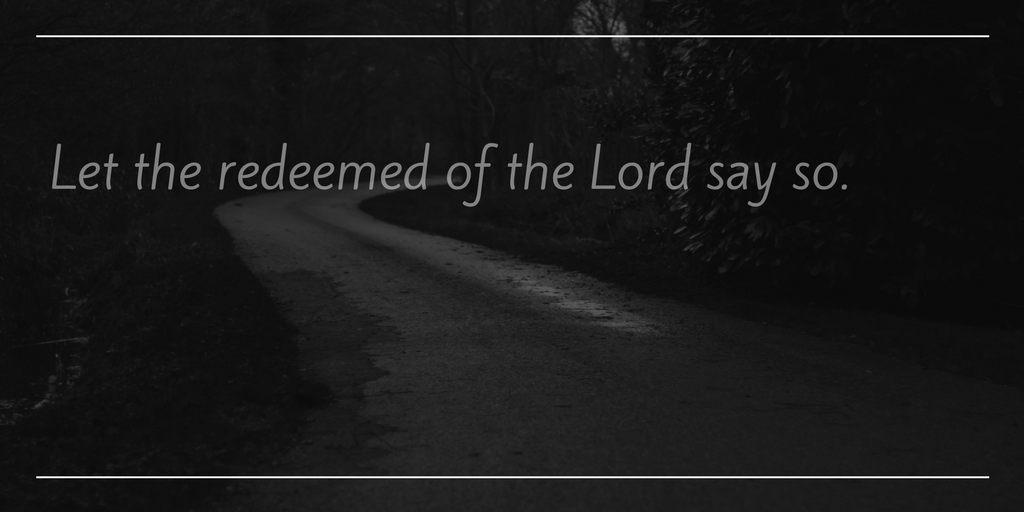Truly, there are times in which I do not sense God’s presence.
At all.
These are usually dull moments of “feeling” nothing when approaching Him in prayer and study. While always mildly disconcerting, I’ve been engaged in these disciplines long enough to know that there are just days like that—maybe I’m tired and unfocused. Maybe my mind is on work or a parenting issue to tackle, or even looking forward to something on my calendar for the day. It may be that the scriptures I am studying do not seem to particularly move my soul or motivate me to action. Or, it could be just that, well, there are days like this.
While I used to fret–and even panic some if a stretch of days like these seem to drag on–but I don’t any longer. I know the answer is to stay disciplined. To be diligent in prayer and study, because while I may not “feel” anything in particular toward or about God on those days, I have accumulated enough evidence to know that the work I am doing in prayer and study is still working on my mind and soul, even when it seems it is not.
So, no……those moments do not cause me to despair.
But, there are moments that do tend to ramp up that old familiar enemy of despair and even fear.
Because some days it seems not as if I am unengaged, but rather that God is far away. Unreachable. Unhearing.
Oh, I know that He is not. I know that He is always near. But knowing with my mind and sensing His presence with my soul are two things that are quite different from each other.
There are times when I am fully engaged—when I am deeply moved to repentance for my sins, or when I am beseeching God to ease the grief that is wracking my soul, or when I am crying out for Him to intervene—and what greets me is a profound sense of silence.
Of words bouncing off of a brass ceiling, with a hollow and echoing “ting. ting. ting.”
Those are times that slay me. Wreck me.
I think that may be why, when I read the words of Psalm 27, I feel a deep kindred with the author.
A word about the Psalms–and if you’ve read my writings before on the Psalms, this should sound very familiar–I view the reading, reflecting and praying through of the Psalms as a cherished gift and honor, because, to me, it is as if we have been invited to peer over the shoulder as the psalmist takes pen or quill or whatever in hand, and puts the words of his very soul to paper. It is a privilege that is not to be taken lightly.
Many people turn to the Psalms for comfort, and that makes sense. There is much comfort to be found. But there is also anguish. Fear. Joy. Uncertainty. Certainty. Anger. Despair. Gladness. Wonder.
In fact…..I can not think of a single human emotion that can not be found in the pages of this book.
Which is why I often turn there, when I am not so sure where else to turn–when I have no words of my own to express to God, I can often find words to pray in the words of the psalmist.
And this is very much the case, with Psalm 27.
To me, Psalm 27 starts off with a sort of “preaching-to-himself” vibe—he seems to be reminding himself who God is: Light. Salvation. Stronghold. He protects from enemies, and causes those enemies to fall. We can have confidence, even when the odds are stacked against us.
It is beautiful. Uplifting. Encouraging.
But in verse 7, we see something of a shift:
Hear, O Lord, when I cry aloud;
be gracious to me and answer me!
8 You have said, “Seek my face.”
My heart says to you,
“Your face, Lord, do I seek.”
9 Hide not your face from me.
Turn not your servant away in anger,
O you who have been my help.
Cast me not off; forsake me not,
O God of my salvation!
Verse 8 particularly grabs me….and I’ve echoed these words to God dozens of times: “God—you said seek your face. I’m here. I’m seeking. I. Am. Seeking. You. Please. Please do not hide your face from me.”
Have you, too, breathed out these words to God from the depths of your very self?
Surely, I am not the one.
“Do not turn away from me God. You have helped me before. You are my only help. You are my only hope. Do not cast me off, do not forsake me. You are my only means of salvation in this situation. You are my only means of salvation, for my life.” (Verse 9).
Yes.
These are words that bubble up out of my mouth and from my pen as I write out the words of my own prayers that become echos of this prayer from this man here in Psalm 27.
But sometimes, even in the throes of such pleas, I may not sense His presence. And it is unsettling.
Why, why does He choose to not make Himself known in such moments? Why does it seem as if He doesn’t hear, and therefore does not act upon our earnest requests?
I don’t know. I wish I did.
Maybe it is because there is something we must learn. Or, maybe it is because there is something in us that must be eradicated or changed or worn down like a river stone. Or maybe the truth is that He is acting upon our imploring words–but in a way that we can not perceive. Or, are not meant to be able to perceive.
Because, truly He is near. He is not far off. Our very breaths each morning are proof of this.
And the psalmist knows this.
His knowledge is reflected just a few short verses later, in these settling words:
I believe that I shall look upon the goodness of the Lord
in the land of the living!
14 Wait for the Lord;
be strong, and let your heart take courage;
wait for the Lord!
And, reading his settledness, helps create settledness in my very own soul, as I peer over his shoulders and recite these own words as if they were my very own: I, too, believe that I shall look upon the goodness of the Lord–yes, in the day that He welcomes me to my true eternal home–but also here in this world, as I wait for Him.
Therefore, as the psalmist preached to his very own soul so many years ago, I, too, will preach to mine:
Be strong.
Take courage.
Wait.




